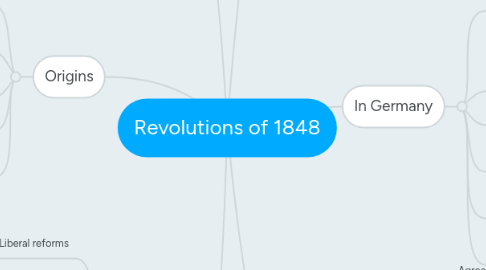Revolutions of 1848
por Philip Drohat


1. Background
1.1. Many instances of constitutional liberal political upheavals
1.2. European states organized as liberal, constitutional or nationalist
1.3. Wages fell for urban and rural workers
1.4. Almost impossible for people to prosper
2. Origins
2.1. Poor grain harvests
2.2. The appearance of blight (a serious disease) in potatoes
2.3. Depressed economic conditions; unemployment
2.4. Radicalization of political attitudes
2.5. Information spread quickly with Telegraph system
3. In Austria
3.1. University students march for Liberal reforms
3.2. Emperor ordered soldiers to withdrawal to their barracks
3.3. Soldiers now widely unwelcome in streets
3.4. Authorities abolished censorship of press
3.5. Austrian emperor abolished Robot obligation
3.6. Austrian authorities imposed many liberal amendements
3.7. The imperial family was forced to depart form Vienna
3.8. Austrian currency plummeted in value and unemployment rose
4. In France
4.1. Only 170,000 out of 35 million could vote
4.2. People did not like Louis Phillipe's bourgeosis liberal monarchy
4.3. Political banquet participants would challenge the government
4.4. Extreme individuals attacked soldiers
4.5. Louis dismissed his unpopular Prime minister, Guizot
4.6. Government of French Republic guarantees work for all
5. In Germany
5.1. March Demands:
5.1.1. Freedom of press
5.1.2. Constitutional governance
5.1.3. All German parliament
5.2. Federal Diet decides changes are necessary to Constitution of German Confederation
5.3. Delegates invited to discuss reform
5.4. German colors associated with liberalism and nationalism
5.5. March 22, 190 Berliner who died in street fight were given funeral
5.6. Frantisek Palacky declined being involved in proceedings at Frankfurt
6. In Hungary
6.1. Agreed that Magyar should displace Latin and German
6.2. Only 40% of population was Magyar
6.3. Nationalist Kossuth also wanted Magyar tongue
6.4. Kossuth supports constitutionally defined government system
6.5. Magyar created 12 demands: (some of them)
6.5.1. Natonal Gaurd
6.5.2. National bank
6.5.3. Trial by jury
6.5.4. Equality of classes
